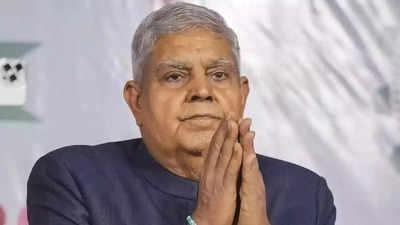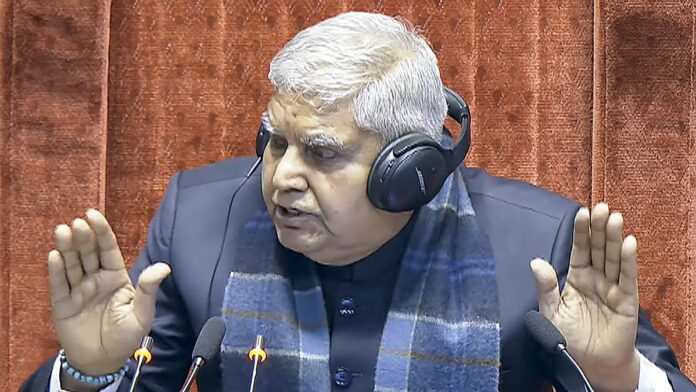Vegetable Knife For Bypass Surgery: This was the sharp metaphor employed by Rajya Sabha Chairperson Jagdeep Dhankhar as he dismissed the opposition’s no-confidence motion against his leadership. Addressing a gathering of women journalists, Dhankhar did not hold back, declaring the motion procedurally flawed, hastily drafted, and riddled with inaccuracies, including a misspelling of his name.
The motion, filed by Congress MPs, accused Dhankhar of undermining opposition voices in the Upper House. However, procedural errors such as not adhering to the 14-day notice period made the motion invalid. Deputy Chairman Harivansh labeled it a deliberate attempt to create a “narrative” against Dhankhar, asserting that the only accurate element of the motion was the 60 MPs’ signatures.
Jagdeep Dhankhar’s Stinging Remarks
“Never use a vegetable-cutting knife for bypass surgery,” Dhankhar quipped, borrowing a phrase from former Prime Minister Chandra Shekhar. The Chairperson likened the motion to a rusted knife, criticizing the lack of diligence in its preparation. “When I read it, I was astonished,” he said, adding that the notice’s contents were so poorly drafted that it would have shocked anyone who examined them closely.
He further expressed disappointment at the lack of media scrutiny. “None of you read it,” he told the journalists, emphasizing the importance of vigilance in evaluating political developments.

Defending Democracy and Free Expression
Dhankhar took the opportunity to champion the right to free expression, calling it the “definition of democracy.” He stressed that freedom of expression must be unqualified and uninfluenced by coercion to maintain the integrity of democratic values.
“Before you use your vocal cords, allow your ears to entertain the other point of view,” Dhankhar advised, arguing that democracy thrives only when diverse opinions are heard and respected.
Congress’s Counterattack
The Congress, however, stood firm in its criticism, with party president Mallikarjun Kharge branding Dhankhar as the “biggest disruptor” of the Rajya Sabha. According to Kharge, Dhankhar’s leadership stifled opposition voices and prevented the party from raising critical issues over the past three years, actions he claimed “hurt the dignity of India.”
The motion was rooted in the opposition’s dissatisfaction with Dhankhar’s handling of debates, particularly concerning the Sonia Gandhi-George Soros controversy. The BJP accused the Congress of leveraging reports from Soros-linked organizations to attack the government and Indian businesses, an allegation the Congress strongly denied.
Kharge asserted that Dhankhar’s actions as Chairperson were biased toward the ruling party, accusing him of systematically undermining the opposition’s role in the Upper House.

The Sonia Gandhi-George Soros Controversy
The backdrop to this parliamentary drama includes heated debates over the Sonia Gandhi-George Soros controversy. The BJP alleged that Soros-founded organizations like the Organised Crime and Corruption Reporting Project (OCCRP) published reports targeting India, which were then used by the Congress to criticize the government.
The Congress dismissed these claims as baseless, declaring, “We are patriots,” and accused the BJP of using the issue to distract from critical topics like the violence in Uttar Pradesh’s Sambhal and allegations against Adani Green Energy.
Procedural Flaws and Political Fallout
The no-confidence motion’s rejection on procedural grounds was a significant setback for the opposition. Procedural lapses, such as failing to adhere to the required notice period and submitting an error-laden document, allowed the BJP to frame the motion as a politically motivated stunt.
For Dhankhar, the incident provided a platform to assert his commitment to democratic principles and call out what he saw as baseless attacks on his leadership. “They have the constitutional right to move a motion against me,” Dhankhar said, “but a campaign against the Chairman day in and day out is unacceptable.”

Lessons for Parliamentary Decorum
This episode highlights the importance of precision in parliamentary proceedings. For the opposition, the motion’s failure underscores the need for greater attention to procedural details and strategic coherence. For the ruling party, it was an opportunity to reinforce its narrative of opposition incompetence and overreach.
Amid escalating political tensions, the incident also raises questions about the role of parliamentary leadership in balancing diverse viewpoints. While Dhankhar’s critics accuse him of bias, his defenders argue that his actions were consistent with parliamentary rules.
As the Rajya Sabha resumes its sessions, the focus will remain on whether both sides can move beyond political theatrics to address the pressing issues facing the nation. Dhankhar’s metaphor may have captured the flaws of the no-confidence motion, but the underlying tensions reflect deeper challenges in India’s parliamentary democracy.

